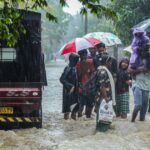
Landslides and floods triggered by heavy rains have caused more than 40 deaths in Sri Lanka, where the authorities have stopped passenger trains and closed roads in some parts of the country, officials say.
The government’s Disaster Management Centre on Thursday said 25 of the reported deaths occurred in the mountainous tea-growing regions of Badulla and Nuwara Eliya in central Sri Lanka about 300km (186 miles) east of the capital, Colombo.
- list 1 of 3Deadly floods and landslides continue to plague Southeast Asia
- list 2 of 3At least 17 people killed in Indonesia floods, landslides
- list 3 of 3Powerful storms, floods bring new challenges to Palestinians in Gaza
end of list
Another 21 people were missing due to landslides in the same areas while 10 people were injured, the centre said.
Sri Lanka began experiencing severe weather last week, made worse by downpours over the weekend that wreaked havoc by flooding homes, fields and roads.
Reservoirs and rivers have overflowed, blocking roads. Some key roads connecting the provinces have been closed, officials said.

Authorities stopped trains in some areas in the mountainous region after rocks, mud and trees fell onto railway tracks. Local television showed workers removing the debris. In some areas, floods have inundated the tracks.
Local television showed an air force helicopter rescuing three people stranded on the roof of a house marooned by floods while navy and police used boats to transport residents.
Footage also showed a car being swept away by floodwaters near the eastern town of Ampara, about 410km (256 miles) east of Colombo, killing three passengers.
Advertisement
This week’s weather-related toll is the highest since June last year when 26 people were killed due to heavy rains. In December, 17 people were killed by flooding and landslides.
The worst flooding this century was in June 2003 when 254 people were killed.
Sri Lanka depends on seasonal monsoon rains for irrigation and hydroelectricity, but experts have warned that the country faces more frequent floods due to the climate crisis.
British Caribbean News


